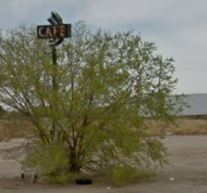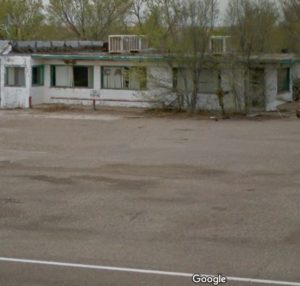Or, lament for another time.
 The place is long closed now. On the flat roof the swamp coolers lie silent and rusted. The once always-on day-and-night blue neon sign is dead, obscured and almost overgrown. The building was green every time I stopped, but I see from the images that it’s white now. Maybe someone thought fresh paint would give the place a boost.
The place is long closed now. On the flat roof the swamp coolers lie silent and rusted. The once always-on day-and-night blue neon sign is dead, obscured and almost overgrown. The building was green every time I stopped, but I see from the images that it’s white now. Maybe someone thought fresh paint would give the place a boost.
Once it was one of my favorite places to stop and take a break. I’d back into the hitching post in front of the No Parking sign, lean the heavy bagger on the kickstand and take a minute to rest my road-weary and aching bones before walking to the end of the building and stepping down onto the diner’s cement floor. I always walked past the tables lining the windows. Instead, I headed for the counter and the short round chrome stools.
The first time there was an old-timer at one of the tables. I gave his faded shirt and jeans the once-over and figured he had a .45 tucked away somewhere on his person. I smiled and nodded and he nodded back. The old man’s eyes wandered to the girl behind the counter and she nodded. He stayed until we got to talking and laughing and then she must have given the old boy a signal and he disappeared.
She was always there, every time I passed through, a dark-haired and dark-eyed woman, sitting behind that counter.
*
I had to look. How could I not? So many years have passed, I needed to see it for myself a final time. (Images courtesy of google maps.)
* * *
The first time I rode through, it was mid-morning. Forty miles ago I was through Dalhart. (I didn’t stop there. That’s another story.) I’d been riding U.S. 54 all night, something I never do any more. Chalk it up to age and knowing better. I was so fatigued I could barely keep my eyes open.
A tired railroad line paralleled the highway. The town was obviously an old cow town, as evidenced by the loading pens on the north side of the road. That must have been a long time ago, because they looked like they’d seen better days. They were grown over and hadn’t been used in forever.
I knew by the sign over the entrance to Ira’s on the opposite side of the highway that it would never be a viable option. Hell, tired as I was, even I could figure out that the rusted and broken neon hanging from the wall was long past its best-before date. I recall thinking it must have stories to tell, and rode on by.
Just a little farther and I crossed paths with a blue and white cafe sign sticking up above the flat horizon. I pulled off the 54 onto an empty gravel parking lot and pushed back against a wooden hitching post. At the time, it seemed to me that a motorcycle or a tied-up horse would be safe at the railing in the former cow town.
The building had definitely seen better days, and not recently. The cafe’s low exterior walls were encased in fading green stucco. The flat roof supported three or four swamp coolers, probably a necessity, given the area’s hot summers.
Thankfully, I didn’t see a window sign advertising the name of the joint as “Mom’s”. One of my road rules dictates that I never eat at a place called Mom’s. At the very least, it would be a safe bet for a bit of grub and a quick coffee to fight the fatigue. I’d be back on the road in no time.
Now that I had ridden into daylight, I didn’t want to burn any on my run south.
I entered through the side door and took a step down onto a cement floor – thus the reason for the low roof-line. A couple of small tables lined the wall under the windows. I headed for the low counter and took up a short chrome stool covered in beat-up, worn-out, thick plastic. If nothing else, I could carry on a little conversation with the woman behind the counter while I drank coffee and warmed my hands.
She poured the coffee and slid one of those old-style, squat, over-sized china mugs with the thick, rounded handle only big enough for one finger in my direction and raised an eyebrow. I shook my head and poured in a little sugar. While I stirred, I investigated the surroundings, and then turned back to face the woman. She sat in front of the old cash register on the opposite side of the counter.
I took a gander at what was inside the pie tray and asked if it was fresh. She said yes, and got up to go into the back. She returned holding a hot metal tray with a dish towel.
That’s fresh, I said, and in front of me she sliced a piece and dished it out. Without a word, the woman went back to the kitchen and came out bearing a giant scoop of ice cream.
I grinned, and said thanks, and she smiled and told me I was welcome.
Her smile was friendly. Nothing more.
That broke the ice, and we kibbitzed back and forth, she from her chair behind the counter, and me from the stool in front. I took a better look and figured she was probably in her late twenties or early thirties, with that tired look around the eyes that comes from gaining too much life experience, too young.
Yes, her face was framed by dark hair. Dark brown eyes reflected the light coming in from the windows. I was so stunned that I don’t recall checking out the rest of her. I couldn’t tear my eyes away from her face.
I did when she started to blush.
Sorry, I told her, I couldn’t help it. Like that was some kind of an excuse. Now I was the one embarrassed.
That’s all right, she replied. It happens sometimes.
She came up with the usual questions. Where I’m from. Where I’m headed. How long on the road this time.
This time. I noticed that.
I volunteered the usual answers, but got stuck on this time.
She noticed that.
I chose to ignore her and instead turned the talking in the direction of some of the places I’d been and the people I’d seen. She not only kept up with me, but managed to get as many laughs from me as I did from her.
I’d call us about even, but not in a Mexican standoff way.
When it came time to go, I really didn’t want to, but you know how it goes.
*

Over the years, I made a habit of stopping by on my way through many times. The stucco had been covered with siding, but everything else was the same. So was she. I liked that.
She would be there, sitting behind the counter. She served the coffee, brought me pie and ice cream, and smiled and laughed when the conversation eventually picked up the rhythm from where we left off.
Then I met a girl and settled. Not for long, though.
When I unsettled, I discovered the small cafe closed and locked. Shuttered permanently against the lonely traveler headed down life’s highways, the cafe and its owner now turned into only a fading memory.
I miss that place. Even more than that, I miss the friendly recognition and the smile and the laughter that came along with it.
